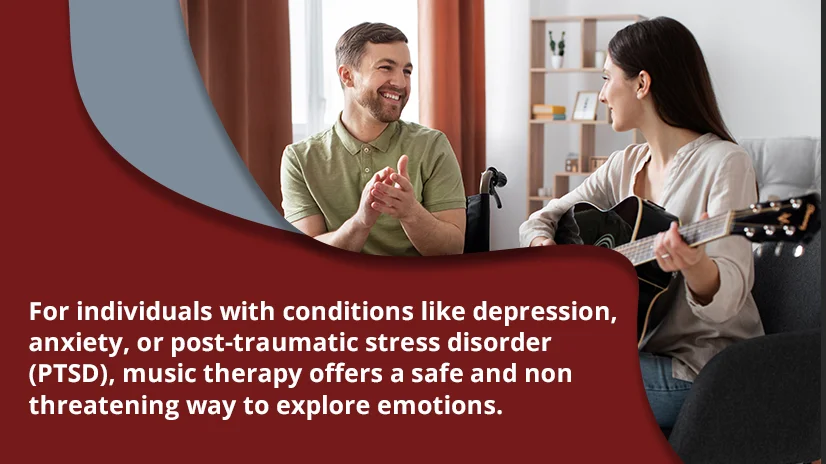
Impact Of Music Therapy On Mental Health
Music therapy leverages the profound impact of music to address various mental health issues. Through structured interventions conducted by trained therapists, music therapy helps individuals manage stress, alleviate anxiety and depression, and enhance cognitive functioning.
By engaging in activities such as listening to music and playing instruments, patients experience improved mood and better social interaction. Reading this article provides valuable insights into the therapeutic benefits of music therapy and its transformative impact on mental health.
Key Takeaways
Music therapy is particularly relevant to mental health because it provides a non-invasive way to address various cognitive issues. Here’s what you need to know:
- Music therapy can significantly reduce anxiety disorders and stress levels by triggering relaxation responses.
- Techniques like improvisation, songwriting, lyric analysis, and music listening offer diverse healing benefits.
- Cognitive function can be enhanced through music therapy, with activities that boost memory and problem-solving skills.
Are you or a loved one struggling with mental health issues? Call Indiana Center for Recovery today at (844) 650-0064 to learn more about our therapy sessions and treatment services.

An Overview Of Music Therapy
Music therapy is a therapeutic approach that makes use of music to improve mental, emotional, and physical health. A trained music therapist uses music to address the needs of individuals, helping them to cope with various conditions or improve their overall well-being.
Music has a powerful effect on the brain. Listening to music activates several areas of the brain, including those involved in emotion, memory, and motor control. Music can stimulate the release of dopamine, a chemical associated with pleasure and reward.
For individuals with conditions like depression, anxiety, or post-traumatic stress disorder (PTSD), music therapy offers a safe and non-threatening way to explore emotions. It can also provide a sense of comfort and support, helping individuals feel less social isolation.
By incorporating music therapy into mental health care, individuals can benefit from a versatile tool that enhances emotional expression and reduces symptoms of anxiety disorders. Knowing about music therapy also empowers individuals to seek out and advocate for this form of mental health treatment.
Types Of Music Therapy
The use of music therapy helps improve mental state and physical health. There are various types of music therapy, each with its unique approach and benefits. Here, we explore the main types:
Active Music Therapy
In active music therapy, clients engage directly in making music. This could include singing, playing instruments, or composing. The focus is on self-expression, creativity, and improving motor skills. It’s an interactive approach that helps clients communicate and process emotions through musical activities.
Receptive Music Therapy
Receptive music therapy involves listening to music. The therapist selects music that suits the client’s needs, and the client listens, often reflecting on their feelings and thoughts afterward. This type of therapy is particularly effective for relaxation, stress reduction, and emotional insight.
Community Music Therapy
Community music therapy emphasizes social interaction and community involvement. Clients participate in group music-making activities, fostering a sense of belonging and social support. This approach is beneficial for building social skills, enhancing communication, and strengthening community ties.
Analytical Music Therapy
Analytical music therapy combines music and psychoanalysis. Clients create music and then discuss its meaning with the therapist. It helps uncover unconscious thoughts and feelings, promoting deeper self-awareness and emotional healing. It’s a process-oriented approach focusing on personal insight and psychological growth.
Whether actively creating music, listening, engaging with a community, or exploring personal insights, music therapy provides a path to healing and self-esteem.
Techniques Used In Music Therapy
Music therapy uses various techniques, and each method has its unique benefits, tailored to meet the needs of different individuals. Here are some key techniques used in music therapy:
Improvisation
Improvisation in music therapy involves creating music spontaneously. This technique helps individuals express themselves creatively, explore their emotions, and develop communication skills. It encourages free expression and can be especially beneficial for those who find it hard to verbalize their feelings.
Songwriting
Songwriting allows individuals to compose their songs. This process can help with self-expression and emotional processing. Writing song lyrics and melodies provides a structured way to explore and articulate personal experiences, thoughts, and emotions, fostering a sense of accomplishment and insight.
Lyric Analysis
Lyric analysis involves discussing and interpreting a song’s lyrics. It helps individuals connect with their emotions and experiences by reflecting on the words and themes of the song. Lyric analysis encourages discussion, enhances understanding of self and others, and can lead to deep emotional insights.
Guided Imagery With Music
Guided imagery with music combines listening to music with visualization exercises. This technique helps individuals relax, reduce stress, and explore their subconscious thoughts and feelings. It often involves a qualified music therapist guiding the individual through a series of mental images.
Music Listening
Music listening in therapy involves listening to carefully selected music to evoke certain emotions or memories. Listening to music helps with relaxation, mood regulation, and emotional expression. It allows individuals to experience the therapeutic relationship with music passively, making it accessible to a wide range of people.
By integrating music into therapy, individuals can find new ways to understand and express themselves, promoting overall physical and psychological health.
Benefits Of Music Therapy For Mental Health
Individuals can experience profound emotional and psychological benefits by engaging in music therapy experiences. Here are some key areas where music therapy can make a significant impact.
Reduction Of Anxiety And Stress
Music therapy can help lower anxiety and stress levels. Listening to comforting music or participating in music-making activities can trigger relaxation responses, reducing the body’s stress hormones and promoting a sense of calm and well-being.
Improvement In Mood Disorders
For individuals with different mood disorders, for example, depression, music therapy can be highly beneficial. It helps elevate a person’s mood, provide a positive emotional outlet, and foster a sense of connection and expression, which are crucial for improving overall mental health conditions.
Enhancement Of Cognitive Function
Music therapy has been shown to boost cognitive function. Activities such as playing instruments or engaging in exercises based on rhythm can improve memory, attention, and cognitive skills, supporting overall brain health and function.
Support For Trauma Recovery
For those recovering from traumatic experiences, music therapy offers a safe space for expression and healing. It helps in processing difficult emotions, reducing symptoms of PTSD, and providing comfort and a sense of control during the recovery journey.
Aid In Substance Abuse Treatment
Music therapy is a valuable component in substance abuse treatment programs. It aids in managing cravings, improving emotional regulation, and providing a healthy, creative outlet for self-expression, which can support long-term recovery efforts.
Incorporating an approved music therapy program into mental health treatment plans can lead to significant improvements in emotional and psychological well-being.
Music Therapy Across Different Populations
Different populations can benefit uniquely from this approach, making it a valuable tool for people of all ages and specific conditions. Here, we explore how:
Children And Adolescents
Music psychotherapy helps children and adolescents by improving communication, emotional expression, and social skills. It can also aid in developmental milestones, reduce anxiety, and enhance focus, especially in those with learning disabilities or behavioral issues.
Adults
For young people, music therapy can alleviate stress, improve mental health, and aid in physical rehabilitation. It is particularly effective in managing depression, anxiety, and chronic pain, providing a non-invasive way to enhance overall well-being and emotional resilience.
Elderly
In elderly populations, music therapy promotes cognitive function, memory recall, and emotional well-being. It is especially beneficial for those with dementia or Alzheimer’s, offering comfort, reducing agitation, and improving the quality of life through engagement and reminiscence.
Specific Populations
For specific populations, like PTSD sufferers, it can reduce symptoms and improve emotional regulation. People with autism may experience improved communication, social behaviors, and sensory regulation, making daily life more manageable.
Addressing unique needs through personalized interventions fosters healing and growth, demonstrating the profound impact of music on overall health.
Integrating Music Therapy With Other Treatments
By integrating the evidence-based use of music interventions with various therapeutic approaches, we can create a holistic care plan for individuals seeking mental health support. Here are the details:
Combination With Psychotherapy
Music therapy can enhance psychotherapy by providing a non-verbal outlet for emotions, aiding in the exploration of feelings, and fostering a deeper connection between the therapist and the client. It helps to break down barriers, making it easier for individuals to express themselves and work through complex emotions.
Inclusion With Medication Management
When combined with medication management, music therapy can improve overall treatment outcomes. It can help alleviate some medication side effects, reduce stress, and enhance mood, making the medical treatment more effective. Music therapy sessions provide a complementary approach that supports the mental health of the patient.
Collaborative Care Approaches
Integrating music therapy into collaborative care involves working with a multidisciplinary team of healthcare providers. This approach ensures that the patient receives proper care tailored to their social needs. Music therapists, doctors, and other specialists work together to create a coordinated form of treatment plan that addresses all aspects of the person’s health.
Frequently Asked Questions (FAQ)
Music therapy has been shown to improve mental health by reducing anxiety, depression, and stress while enhancing mood and emotional well-being. Research indicates that music therapy can lower cortisol levels, boost dopamine, and facilitate emotional expression and processing.
Studies have also found that music therapy can improve cognitive function and social interaction, particularly in persons with mental health disorders. By providing a non-verbal outlet for emotions and fostering a sense of connection, music therapy contributes to overall mental health improvement and resilience.
Research indicates that music therapy can be highly effective, with certain types being particularly beneficial. Classical music, especially compositions by Mozart and Bach, is often cited for its calming effects. Nature sounds mixed with gentle instrumental music are also popular for reducing stress and anxiety.
Additionally, rhythmic drumming can aid in emotional expression and social interaction, especially in group settings. Jazz and blues are noted for their ability to help individuals process emotions and cope with depression. Personalized playlists tailored to individual preferences also show significant therapeutic effects.
Music therapy offers numerous benefits, such as reducing anxiety, improving mood, enhancing cognitive function, and aiding in pain management. It can be particularly effective for patients with Alzheimer’s, autism, and depression. However, there are some drawbacks, including variability in individual responses, the need for specialized clinical training for therapists, and limited availability in some areas.
Additionally, some studies highlight the potential for emotional discomfort or overstimulation in certain individuals. Despite these cons, the overall agreement is that the power of music therapy is a valuable complementary treatment for many conditions.



